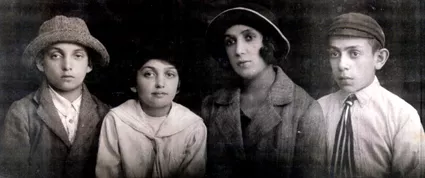Rebecca Seviov with her sisters and brother.
This is my mother Rebecca Seviov with her sisters and brother. From left to right: my mother, her younger sister Ida, mother's elder sister Esfir and brother Lazar Seviov. The picture was made in Narva in 1919. This is a copy. The original is in the museum of Narva Jewish community.
I do not know much about mother's family. There is little I know about Seviov. It is as pity. Grandfather, must have been a very good and unusual person. He was born in 1868 in the city of Gdov, Pskov, oblast, Russia, about [700 km from Moscow, close to Estonian border]. I even do not know if it still exists. Great grandfather was also the soldier of the tsarist army. He had served for 25 years. When he was decommissioned from the army, he married. There was a pale of settlement in Russia, and Jews were no allowed to live anywhere they were willing to. This did not refer to those Jews who had served in the army- they were permitted to chose from larger territory of Russia. There were several children, but I did not know them. Grandfather was a tailor. He moved to Narva from Gdov. I do not know how grandparents met. Probably it was a prearranged marriage. When they got married, grandmother moved to Narva. Grandmother, as most of the married Jewish women was a homemaker,. She gave birth to children, raised them and took care of the house. Grandparents did not have their own house. The rented the 2nd floor of the loghouse from one Estonian man. The first floor of the house was occupied by the landlord and his family. There were 7 children in the family. The eldest son was Isaac, then was daughter Esfir was born on, the third was my future mother Rebecca, born on 1 February 1906. At the end of 1907 son Lazar was born in son and in couple of years another son, Mulya, and then another one, Abram. The last child was daughter Ida.
Shortly after WW1 elder son Isaac left for Russia to seek fortune. When revolution took place in Russia, Isaac happened to be on the soviet territory and was separated from his family. First he wrote letters to the family, especially to Esfir, as they were bonded. Then it became dangerous for the citizens of Soviet Union to keep in touch with the relatives abroad, and they stopped writing to each other.
All children got religious education. Boys went to cheder and daughters were taught by. All children went to the elementary school only. Only Lazar got a secular education, whom grandfather sent to lyceum. Lazar was very gifted since childhood. Grandfather paid his son's tuition, but there was no money for the books. Lazar managed to become the second top student in the lyceum without having his own books.
Grandfather was very religious. Narva Jew respected him, listened to his words, though he was a simple man. He was considered almost a saint. He kept the door open for people and almost anybody could come to him for a support. In 1920 grandfather Iosif Seviov died. Nobody helped the orphaned family. Grandmother remained by herself with five children. She did not have any profession, and she started working as a seamstress. There was not enough money and soon family turned into very poor. The family starved, had no money for the rent. They had lived for three years without paying for the rent. The Estonian landlord helped them a lot. He had not asked them to pay for accommodation. The eldest sister Esfir was the first to leave for Tallinn. Soon the whole family went there. Children started working and save money. One day they came in Narva and paid off the debt to the landlord. He told them: "Children took after their father".
















